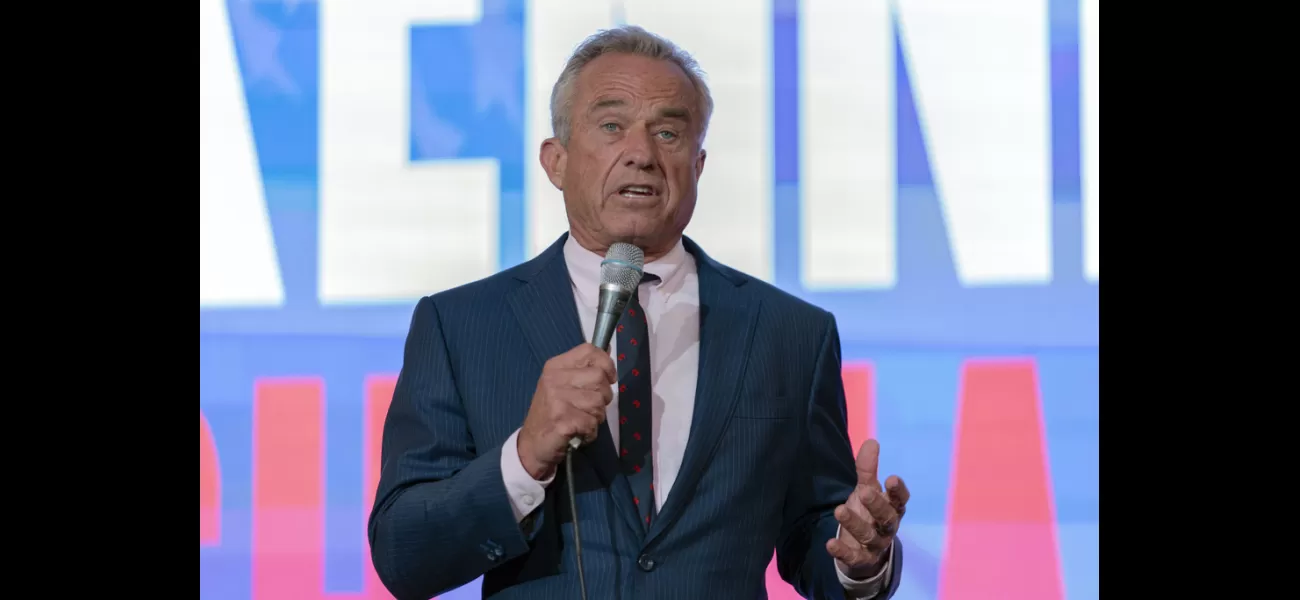Court decides RFK Jr cannot run for president despite his efforts to be included on ballot.
Judge's ruling could prevent Kennedy's appearance on NY ballot and spark challenges in other states.
August 13th 2024.

A judge made a ruling on Monday that could greatly impact the upcoming presidential election. The decision stated that Robert F Kennedy Jr, an independent candidate, will not be allowed to have his name on the ballot in New York. It was discovered that Kennedy had falsely claimed to have a residence in New York on his nominating petitions, despite actually living in California.
Kennedy's lawyers were quick to announce their plans to appeal the ruling before the August 15 deadline. If the judge's decision is upheld, it could not only prevent Kennedy from being on the ballot in New York, but it could also lead to challenges in other states where he used a New York City suburb address to gather signatures.
Shortly before this ruling, a North Carolina judge had decided that Kennedy could remain on their state's ballot despite a separate challenge on different grounds.
Judge Christina Ryba, in her 34-page decision, stated that the bedroom Kennedy had claimed as his home in New York was not a true residence, but rather a "sham" address that he used to maintain his voter registration and further his political campaign. She also commented on the unlikelihood of Kennedy actually living in that spare bedroom with his wife, family, multiple pets, and all of his personal belongings.
According to Ryba, evidence presented during the trial showed that Kennedy had a history of borrowing addresses from friends and family in order to maintain his voter registration in New York while actually living in California. This practice, she stated, goes against Election Law and could potentially lead to fraud and political mischief.
The Democratic-aligned political action committee, Clear Choice Action, who backed the legal challenge, made a statement about the ruling, claiming that Kennedy had lied about his residency and provided a false address on his filing papers and candidate petitions in New York, intentionally misleading election officials and betraying voters' trust.
The lawsuit was filed on behalf of several voters in the state, who claimed that Kennedy's state nominating petition listed a residence in Katonah, a wealthy town in New York, when he actually lived in Los Angeles with his wife, Cheryl Hines, since their marriage in 2014. Kennedy, who had previously led an environmental group in New York and is the son of former New York senator Robert F Kennedy, argued during the trial that he has strong ties to the state and plans to move back.
Throughout the four-day trial, Kennedy testified that he currently rents a room in a friend's home in Katonah, but has only slept in that room once due to his constant campaign travels. He also stated that his move to California was motivated by his desire to be with his wife and that he always intended to return to New York.
However, the judge also heard from Barbara Moss, the woman who rents the room to Kennedy, who stated that he pays $500 a month but there is no written lease and Kennedy's first payment was not made until after a story was published in the New York Post questioning his claim to live at that address. Additionally, a longtime friend of Kennedy's testified that although he had stayed as an overnight guest at his Westchester home from 2014 to 2017, he was not a tenant as Kennedy had claimed.
Kennedy faced heated questioning from attorneys representing New York voters as they presented government documents and a social media video that appeared to contradict his claims. The judge also noted that Kennedy's testimony about not owning any furniture, bedding, or decorative items in the spare bedroom, as well as his wife, family, and pets all remaining in California, provided further evidence that he did not have a true physical presence or intention to live at the Katonah address.
Despite these legal challenges, Kennedy's campaign has stated that he has enough signatures to qualify for the ballot in most states. However, this has not stopped the numerous lawsuits and challenges he has faced in several states. Kennedy has also expressed concerns that if he is knocked off the ballot in New York, it could lead to legal battles in other states where he listed the same address on his campaign documents.
After the trial, Kennedy argued that the people who signed his petitions should have the opportunity to vote for him. He stated that many Americans want to see him on the ballot and have a choice in the election. As the deadline for the appeal approaches, Kennedy's future on the ballot remains uncertain. Stay updated on the latest breaking news, celebrity updates, and sports news by following our WhatsApp channel. No comments, no algorithm, and your private details will remain safe.
Kennedy's lawyers were quick to announce their plans to appeal the ruling before the August 15 deadline. If the judge's decision is upheld, it could not only prevent Kennedy from being on the ballot in New York, but it could also lead to challenges in other states where he used a New York City suburb address to gather signatures.
Shortly before this ruling, a North Carolina judge had decided that Kennedy could remain on their state's ballot despite a separate challenge on different grounds.
Judge Christina Ryba, in her 34-page decision, stated that the bedroom Kennedy had claimed as his home in New York was not a true residence, but rather a "sham" address that he used to maintain his voter registration and further his political campaign. She also commented on the unlikelihood of Kennedy actually living in that spare bedroom with his wife, family, multiple pets, and all of his personal belongings.
According to Ryba, evidence presented during the trial showed that Kennedy had a history of borrowing addresses from friends and family in order to maintain his voter registration in New York while actually living in California. This practice, she stated, goes against Election Law and could potentially lead to fraud and political mischief.
The Democratic-aligned political action committee, Clear Choice Action, who backed the legal challenge, made a statement about the ruling, claiming that Kennedy had lied about his residency and provided a false address on his filing papers and candidate petitions in New York, intentionally misleading election officials and betraying voters' trust.
The lawsuit was filed on behalf of several voters in the state, who claimed that Kennedy's state nominating petition listed a residence in Katonah, a wealthy town in New York, when he actually lived in Los Angeles with his wife, Cheryl Hines, since their marriage in 2014. Kennedy, who had previously led an environmental group in New York and is the son of former New York senator Robert F Kennedy, argued during the trial that he has strong ties to the state and plans to move back.
Throughout the four-day trial, Kennedy testified that he currently rents a room in a friend's home in Katonah, but has only slept in that room once due to his constant campaign travels. He also stated that his move to California was motivated by his desire to be with his wife and that he always intended to return to New York.
However, the judge also heard from Barbara Moss, the woman who rents the room to Kennedy, who stated that he pays $500 a month but there is no written lease and Kennedy's first payment was not made until after a story was published in the New York Post questioning his claim to live at that address. Additionally, a longtime friend of Kennedy's testified that although he had stayed as an overnight guest at his Westchester home from 2014 to 2017, he was not a tenant as Kennedy had claimed.
Kennedy faced heated questioning from attorneys representing New York voters as they presented government documents and a social media video that appeared to contradict his claims. The judge also noted that Kennedy's testimony about not owning any furniture, bedding, or decorative items in the spare bedroom, as well as his wife, family, and pets all remaining in California, provided further evidence that he did not have a true physical presence or intention to live at the Katonah address.
Despite these legal challenges, Kennedy's campaign has stated that he has enough signatures to qualify for the ballot in most states. However, this has not stopped the numerous lawsuits and challenges he has faced in several states. Kennedy has also expressed concerns that if he is knocked off the ballot in New York, it could lead to legal battles in other states where he listed the same address on his campaign documents.
After the trial, Kennedy argued that the people who signed his petitions should have the opportunity to vote for him. He stated that many Americans want to see him on the ballot and have a choice in the election. As the deadline for the appeal approaches, Kennedy's future on the ballot remains uncertain. Stay updated on the latest breaking news, celebrity updates, and sports news by following our WhatsApp channel. No comments, no algorithm, and your private details will remain safe.
[This article has been trending online recently and has been generated with AI. Your feed is customized.]
[Generative AI is experimental.]
0
0
Submit Comment





